Microsoft Dynamics 365 Vs. NetSuite Guide 2026
Dec 23, 2024
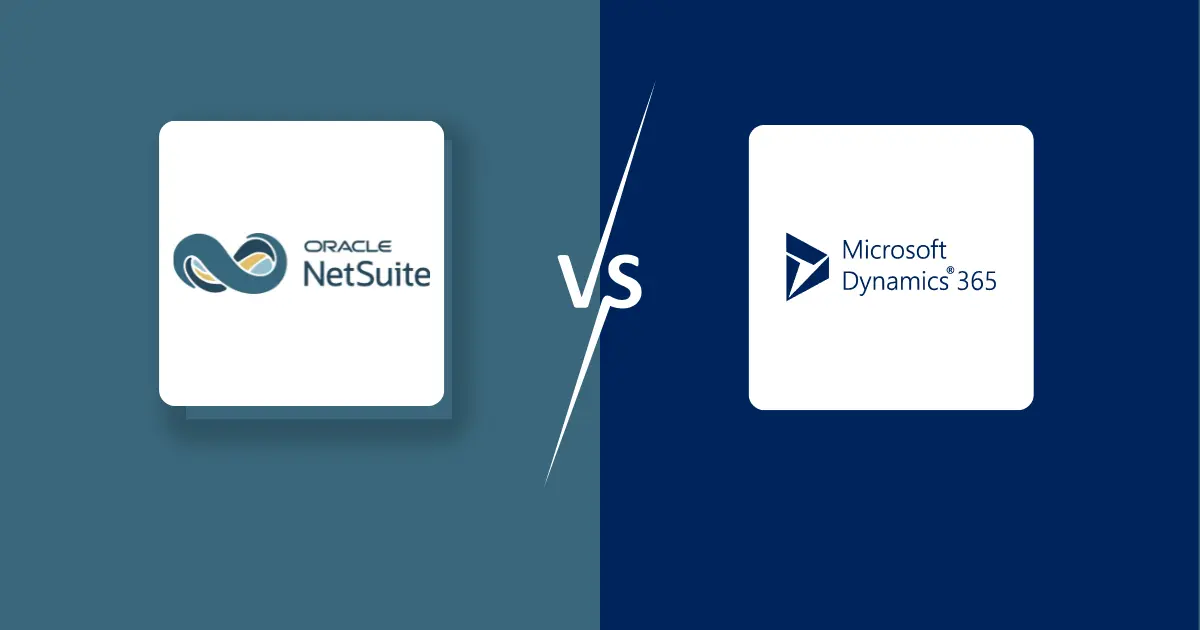
Choosing between Microsoft Dynamics 365 and Oracle NetSuite can feel like a tough decision. Both are top-tier platforms offering powerful tools for managing customer relationships (CRM) and business operations (ERP), but how do you know which one’s right for your business?
However, before Dynamics 365, Microsoft had another legacy ERP system – Dynamics AX – which many businesses previously used.
In this blog, we will first compare NetSuite vs. Dynamics AX to help businesses still using AX understand their best upgrade path. Then, we’ll move on to the core comparison of NetSuite vs. Dynamics 365, helping businesses determine the best ERP for their needs.
Microsoft Dynamics AX (formerly Axapta) was an on-premise ERP solution designed for mid-sized and large enterprises. It covered various business functions like finance, sales, inventory, procurement, and manufacturing. However, with the rise of cloud computing, Microsoft discontinued Dynamics AX, ending mainstream support in October 2021 and shifting focus to Dynamics 365 Finance & Operations.
| Feature | NetSuite | Dynamics AX (Legacy) | Dynamics 365 |
|---|---|---|---|
| Deployment | Cloud-based (SaaS) | On-premise (with some cloud-hosted versions) | Cloud-first, with hybrid options |
| Scalability | Highly scalable for SMBs & Enterprises | Limited by on-premise infrastructure | Scalable for mid-large enterprises |
| Upgrades & Support | Automatic updates, continuous support | Discontinued; no further updates | Regular cloud updates & support |
| Customization | Flexible customization & integrations | Customizable but required on-premise IT expertise | Highly customizable, integrates with Microsoft tools |
| Migration Path | Cloud-native from the start | Must migrate to Dynamics 365 | Continuation of AX in the cloud |
With Dynamics AX no longer supported, existing users must transition to Dynamics 365 Finance & Operations for a seamless Microsoft experience or explore NetSuite as a fully cloud-native, scalable alternative.
As businesses move beyond Dynamics AX, the choice now lies between NetSuite and Dynamics 365—each offering unique advantages. Let’s dive into their key differences.
Microsoft Dynamics 365 is a cloud based suite of integrated business applications designed to help businesses operate more efficiently while delivering better customer experiences. It combines functionalities for customer relationship management (CRM) and enterprise resource planning (ERP) into one unified platform. Dynamics 365 enables businesses to manage key functions such as:
The platform is highly flexible and can be tailored with different modules to suit the needs of small, mid-size, and large businesses. Dynamics 365 also integrates seamlessly with existing systems and applications, making it easy to connect people, processes, and data across the organization. Available on a subscription basis, it offers various pricing options to accommodate businesses of all sizes.
| Application | Core Purpose |
|---|---|
| Dynamics 365 Business Central | Unifies finance, sales, service, and operations—ideal for small and midsize businesses. |
| Dynamics 365 Sales | AI-powered CRM to boost sales productivity and close deals faster. |
| Dynamics 365 Customer Insights | Combines customer data and real-time journeys for personalized experiences. |
| Dynamics 365 Customer Service | Enhances support operations using AI and automation for quicker resolution. |
| Dynamics 365 Contact Center | Omnichannel solution for managing customer engagement across voice and digital. |
| Dynamics 365 Field Service | Optimizes field operations and improves service delivery with connected tools. |
| Dynamics 365 Supply Chain Management | Enhances supply chain resilience with intelligent planning and real-time data. |
| Dynamics 365 Finance | Provides financial visibility and automation for strategic decision-making. |
| Dynamics 365 Project Operations | Connects sales, resourcing, delivery, and billing for project-based businesses. |
| Dynamics 365 Human Resources | Manages core HR functions and supports employee productivity and wellbeing. |
| Dynamics 365 Commerce | Delivers seamless, unified shopping experiences across channels and platforms. |
NetSuite is a comprehensive, cloud-based enterprise resource planning (ERP) platform designed to help businesses streamline their operations, manage finances, and grow effectively. It provides an all-in-one solution that integrates various functions such as:
NetSuite is ideal for businesses looking for a scalable platform that supports both small and large-scale operations. With a focus on providing real-time insights, NetSuite helps businesses automate processes, improve efficiency, and make data-driven decisions across various departments.
When comparing the CRM capabilities of both NetSuite and Microsoft Dynamics 365, it’s important to understand how each platform approaches customer relationship management. Both platforms offer a suite of features designed to enhance customer interactions, streamline sales processes, and drive better customer service.
NetSuite’s CRM system is fully integrated with its ERP and other business processes. It provides a 360-degree view of customer interactions and manages everything from sales and marketing to customer service. Key features include:
Microsoft Dynamics 365 offers a unified CRM and ERP experience. Its CRM module is designed to foster collaboration across sales, marketing, and customer service teams, all while delivering actionable insights. Key features include:
| Module | NetSuite CRM Features | Microsoft Dynamics 365 CRM Features |
|---|---|---|
| Sales Force Automation | – Opportunity management – Sales forecasting – Quote and order management – Incentive compensation management – Customizable sales workflows | – Opportunity management – Sales forecasting – Quote and order management – Advanced sales analytics – AI-powered insights for sales performance |
| Customer Service Management | – Case management – Customer portal – Knowledge management – Time tracking – Customer satisfaction surveys | – Case management – Customer portal with self-service options – Omni-channel communication (email, chat, social media) – AI-driven customer insights |
| Marketing Automation | – Campaign management – Email marketing – Lead nurturing – Lead scoring – Segmentation | – Campaign management – Email marketing – Lead nurturing – Predictive analytics for lead scoring – Cross-channel marketing management |
| Customer Analytics | – Real-time insights – Customer segmentation – Sales performance tracking – Customer lifetime value analysis | – AI-powered insights – Customer segmentation – Sales performance tracking – Predictive analytics for customer behavior |
| Integration | – Seamless integration with NetSuite ERP – SuiteApps – Third-party integrations | – Integration with Microsoft 365 apps (Teams, SharePoint, Outlook) – Third-party app integrations via Power Automate |
| Mobile Accessibility | – Mobile app for CRM data and sales management – Real-time updates on the go | – Mobile app for managing customer relationships and sales – Power BI integration for mobile dashboards |
| Collaboration Tools | – Shared dashboards – Team communication tools – Document sharing | – Collaboration via Microsoft Teams – Shared dashboards – Document sharing via OneDrive and SharePoint |
When considering the pricing of both CRM systems, it’s essential to understand that both NetSuite and Microsoft Dynamics 365 offer subscription-based pricing with different tiers depending on the size and needs of the organization.
| Pricing Tier | NetSuite CRM | Microsoft Dynamics 365 CRM |
|---|---|---|
| Small Business | Custom pricing based on business size and needs. Typically more affordable for small businesses, with flexibility in scaling. | Starts at approximately $65 per user/month for Sales Professional. |
| Medium Enterprise | Subscription-based model. Pricing varies based on the number of users and customization requirements. | Pricing starts at approximately $95 per user/month for Sales Enterprise. |
| Large Enterprise | Enterprise-level pricing with customized modules and features. Typically more expensive with greater customization for larger businesses. | Pricing for Sales Premium is approximately $135 per user/month. |
| Additional Costs | Additional costs may include integration with NetSuite ERP and third-party apps. | Extra costs for advanced features like AI-driven analytics, Power BI integration, and additional user licenses. |
| Feature | NetSuite CRM | Microsoft Dynamics 365 CRM |
|---|---|---|
| 🔹 Pros | ||
| Integration with ERP / Apps | Seamless integration with NetSuite ERP, offering a full-suite business management solution. | Strong integration with Microsoft products (Office 365, Teams, etc.), providing a unified experience. |
| Customization | Highly customizable to fit the unique needs of various industries. | Customizable and scalable with flexible modules to grow with your business. |
| Comprehensive Customer Data | Strong tools for managing sales, marketing, and customer service all in one platform. | Advanced AI tools for sales forecasting, customer insights, and lead scoring. |
| 🔻 Cons | ||
| Pricing | May be considered expensive for small businesses. | Complex pricing structure, which can be difficult to estimate without a consultation. |
| Complexity | Broad functionality may lead to a steep learning curve for new users. | High degree of customization can result in additional costs. |
| Out-of-the-Box Features | Some businesses may require extra customization to fully leverage the system’s capabilities. | Not as focused on small business needs, making it less affordable and more complex for basic use. |
| NetSuite CRM Clients | Microsoft Dynamics 365 CRM Clients |
|---|---|
| GoPro | Coca-Cola |
| Lucky Brand | Adobe |
| Sony | HP Inc. |
| The Wet Seal | BMW Group |
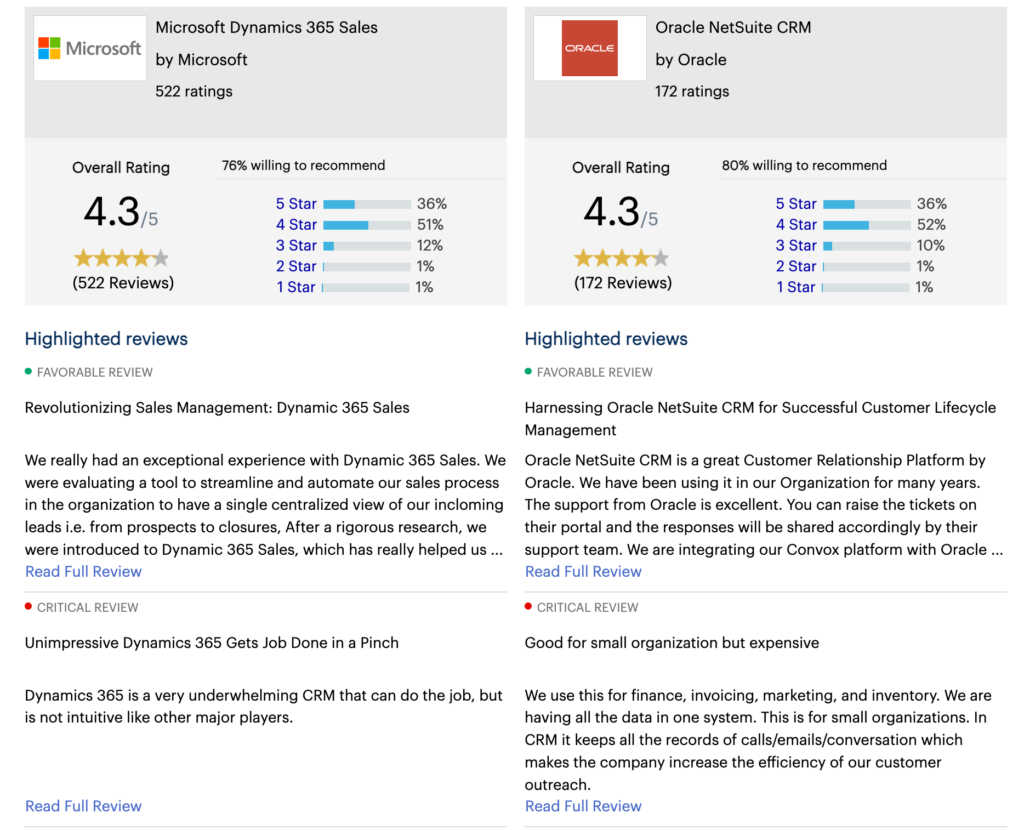
NetSuite ERP is a cloud-based solution designed to help businesses manage and automate their core business processes. It is known for its strong financial management capabilities, comprehensive reporting tools, and supply chain management features. Some of the key modules included are:
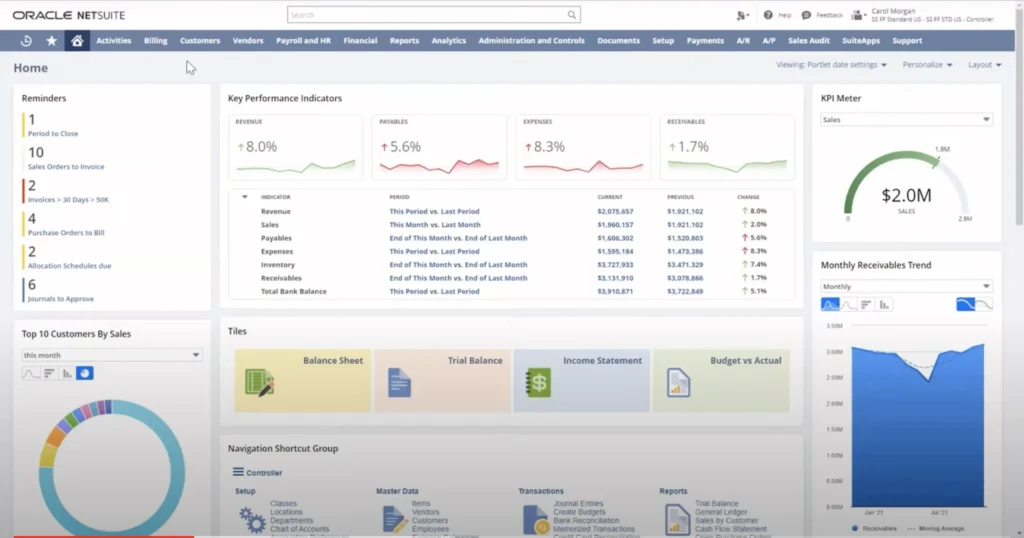
Microsoft Dynamics 365 ERP is a suite of applications designed to help businesses optimize their operations. With deep integration into the broader Microsoft ecosystem, it provides solutions across finance, operations, and human resources. Key features of Dynamics 365 ERP include:
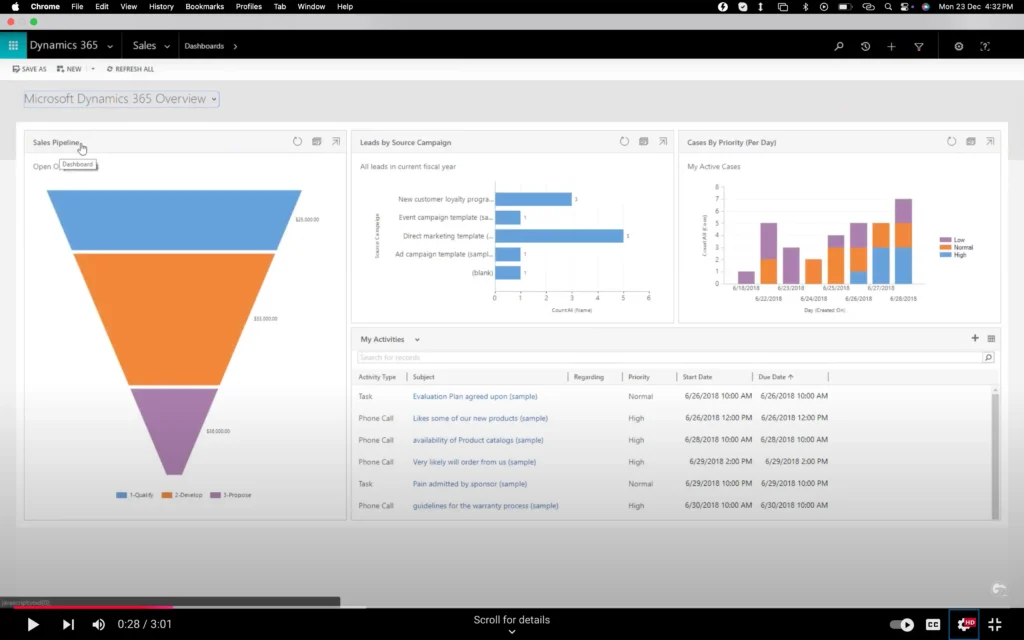
| Module | NetSuite ERP Features | Microsoft Dynamics 365 ERP Features |
|---|---|---|
| Financial Management | General ledger, accounts payable/receivable, financial reporting, budgeting, fixed asset management | General ledger, budgeting, accounts payable/receivable, reporting |
| Supply Chain Management | Inventory tracking, demand planning, procurement, supply chain visibility, supplier management | Inventory management, warehouse operations, procurement, supplier management |
| Order Management | Order processing, invoicing, fulfillment, returns management, billing | Sales order management, procurement, invoicing, returns management |
| Production Management | Work order management, production tracking, scheduling, production planning, shop floor control | Bill of materials, work order management, production planning, shop floor management |
| Human Resources | HR management, employee records, payroll processing (via integration), benefits, employee self-service | Employee management, payroll, recruitment, leave management |
| Project Management | Budgeting, resource allocation, project tracking, timesheet management, project costing, task management | Project planning, resource management, project tracking, task management |
| Customer Relationship Management (CRM) | Integrated CRM for sales forecasting, customer service management, and sales pipeline | Built-in CRM for managing customer accounts, service, and sales pipeline |
| Business Intelligence (BI) | Real-time dashboards, analytics, KPI tracking, financial reporting | Built-in analytics, reporting, and dashboard functionalities |
| Feature | NetSuite ERP | Microsoft Dynamics 365 ERP |
|---|
Pros |
| Comprehensive Functionality | Offers an all-in-one suite covering finance, CRM, and operations, making it ideal for businesses needing a holistic solution. | Integration with Microsoft products (Office 365, Power BI, Azure) provides a unified experience. |
| Scalability | Suitable for small to large enterprises, with flexibility for growth and global expansion. | Flexible licensing enables businesses to scale up or down based on needs. |
| Cloud-Based | Fully cloud-based, ensuring accessibility from anywhere, automatic updates, and security. | User-friendly interface simplifies training and daily use. |
| Customization | Extensive customization options and supports SuiteScript for tailored solutions. | Strong customization capabilities with Power Apps and integrations. |
Cons |
| Complexity | Large number of features and modules can make implementation complex, requiring time and expertise. | Complex pricing structure can be difficult to estimate based on selected modules. |
| Cost | Higher starting price and costs associated with customization or additional modules may be prohibitive. | Limited advanced features may not meet the needs of larger enterprises. |
| Learning Curve | Users may face a steep learning curve during onboarding due to vast functionality. | Customization can be expensive, especially when adding custom functionalities. |
| NetSuite ERP Clients | Microsoft Dynamics 365 ERP Clients |
|---|
| GE | Heineken |
| L’Oréal | Toyota |
| Honeywell | Metro AG |
| RSM International | Delta Airlines |
| Aspect | NetSuite ERP | Microsoft Dynamics 365 ERP |
|---|
| Industry Focus | Strong focus on e-commerce, manufacturing, retail, and wholesale distribution. Well-suited for industries requiring a unified solution for complex supply chain, inventory, and financial management. | Focuses on industries like finance, retail, professional services, and manufacturing. Ideal for businesses that need flexibility across various sectors, especially with customer-centric operations. |
| Client Focus | Primarily targets mid-market to large enterprises, especially those in high-growth stages, with complex business needs and multi-national operations. | Serves a wide range of industries, focusing on small to medium-sized businesses with a solid presence in larger enterprises. Highly popular among companies already using Microsoft tools. |
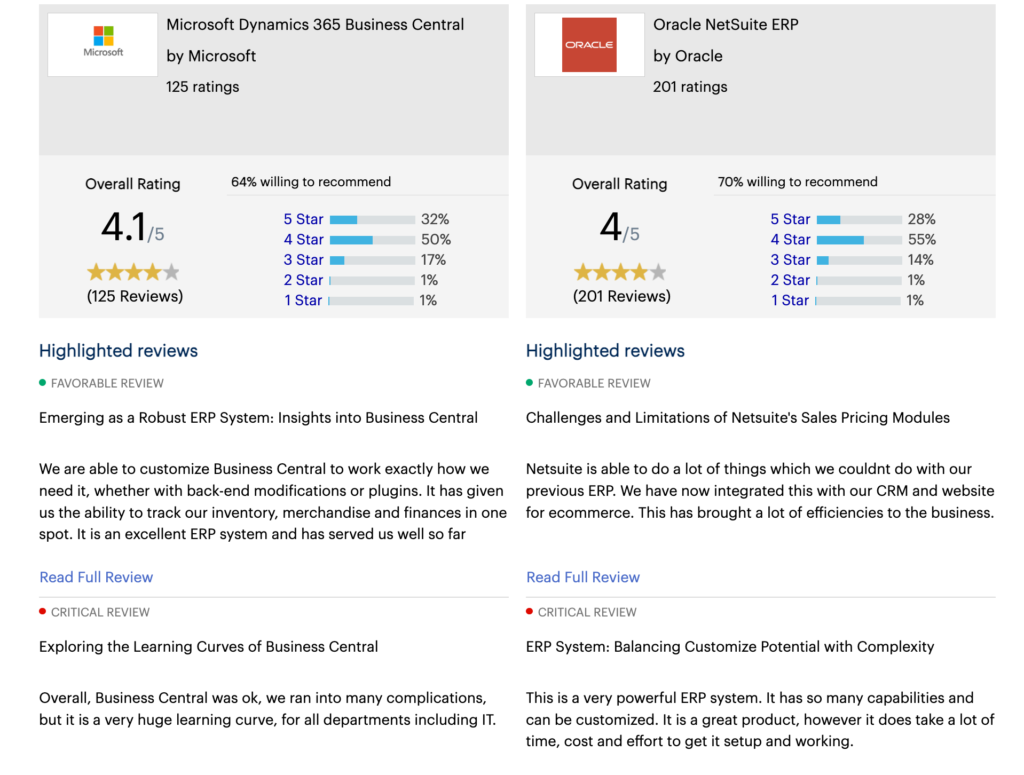
When deciding between NetSuite ERP and Microsoft Dynamics 365, it’s essential to assess your company’s specific needs. Both are robust, cloud-based solutions with strong CRM and ERP capabilities, but they cater to different business types and industries. Factors like business size, industry requirements, budget, and specific features you need will help guide your decision.
NetSuite is ideal for fast-growing companies and large enterprises looking for comprehensive ERP solutions, particularly in sectors like manufacturing, retail, and eCommerce. Its unified platform provides end-to-end business management. On the other hand, Microsoft Dynamics 365 is a great choice for businesses seeking a flexible, modular approach with integration capabilities that align with Microsoft products.
both NetSuite and Microsoft Dynamics 365 offer powerful CRM and ERP capabilities, each catering to different business needs. NetSuite excels as an all-in-one cloud solution, ideal for companies seeking comprehensive functionality across finance, operations, and customer management. Its industry-specific features make it a strong choice for businesses that need deep, integrated solutions.
Microsoft Dynamics 365, on the other hand, provides a flexible, modular approach, allowing businesses to pick and choose the features they need. Its seamless integration with Microsoft tools and customizable options makes it an attractive option for companies already using Microsoft products. The choice depends on your business goals, integration needs, and industry focus.